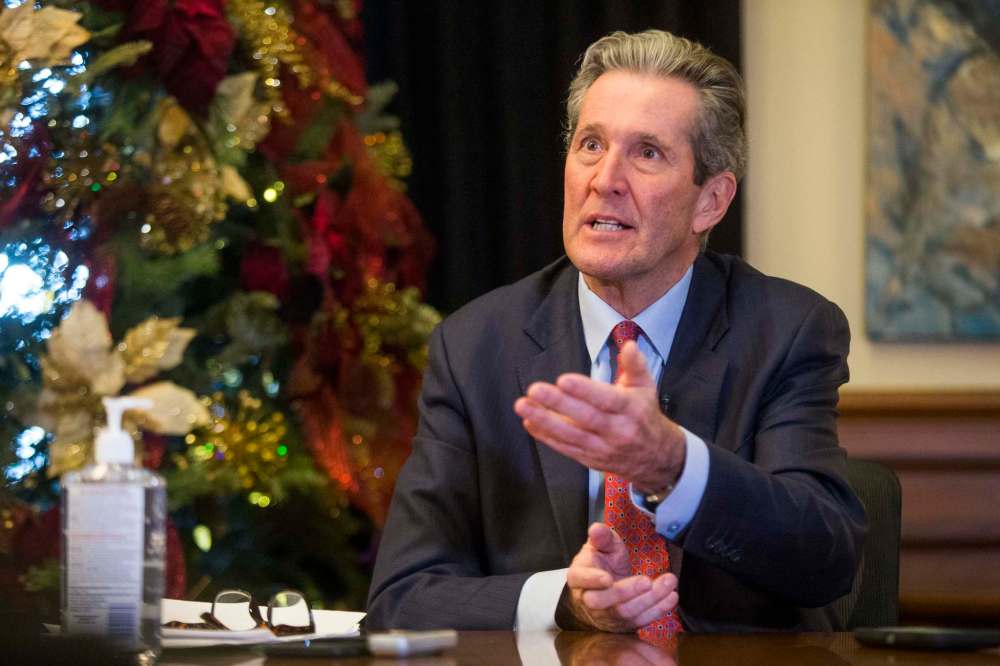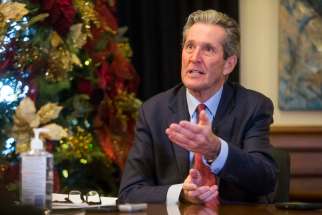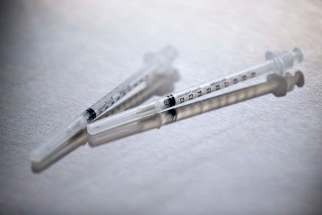Manitoba alters course: more vaccinations, restrictions reconsidered Confidence in supply chain may lead to loosening code red grip, premier says
Read this article for free:
or
Already have an account? Log in here »
To continue reading, please subscribe:
Monthly Digital Subscription
$0 for the first 4 weeks*
- Enjoy unlimited reading on winnipegfreepress.com
- Read the E-Edition, our digital replica newspaper
- Access News Break, our award-winning app
- Play interactive puzzles
*No charge for 4 weeks then price increases to the regular rate of $19.00 plus GST every four weeks. Offer available to new and qualified returning subscribers only. Cancel any time.
Monthly Digital Subscription
$4.75/week*
- Enjoy unlimited reading on winnipegfreepress.com
- Read the E-Edition, our digital replica newspaper
- Access News Break, our award-winning app
- Play interactive puzzles
*Billed as $19 plus GST every four weeks. Cancel any time.
To continue reading, please subscribe:
Add Free Press access to your Brandon Sun subscription for only an additional
$1 for the first 4 weeks*
*Your next subscription payment will increase by $1.00 and you will be charged $16.99 plus GST for four weeks. After four weeks, your payment will increase to $23.99 plus GST every four weeks.
Read unlimited articles for free today:
or
Already have an account? Log in here »
Hey there, time traveller!
This article was published 30/12/2020 (1809 days ago), so information in it may no longer be current.
In an effort to vaccinate more Manitobans quickly, the province will now hold back fewer doses of COVID-19 vaccine for booster shots than originally planned.
Speaking to reporters in his office Wednesday, Premier Brian Pallister said the government is now confident it will receive steady vaccine supplies.
Instead of holding back a dose of vaccine for every person immunized — to ensure Manitobans get their required booster shots on time — the province will retain a smaller “safety stock,” amounting to a week to 10 days’ worth of vaccinations, in case a shipment is delayed.
“We’re more confident in our supply chains now,” the premier said.
Meanwhile, Pallister hinted the current local code red restrictions could soon be eased. Manitoba announced 130 new COVID-19 cases — well below the average in recent weeks — and two more deaths Wednesday.
“I think it’s almost certain that there will be some easing of restrictions.” – Premier Brian Pallister
“I think it’s almost certain that there will be some easing of restrictions,” he said of the public health orders scheduled to be in place until Jan. 8.
Just a day earlier, Manitoba’s acting deputy chief provincial public health officer, Dr. Jazz Atwal, had suggested Manitoba would continue holding back half the vaccine doses to ensure each person who receives a first dose also gets the second, some three weeks later.
Travel abroad
Manitoba Premier Brian Pallister says he’s unaware of any members of his Tory cabinet or caucus travelling abroad during the Christmas break, adding he expects them to set a good example.
Manitoba Premier Brian Pallister says he’s unaware of any members of his Tory cabinet or caucus travelling abroad during the Christmas break, adding he expects them to set a good example.
Pallister was asked Wednesday about his MLAs’ potential travel, in light of the furor in Ontario over a holiday trip to St. Barts by that province’s finance minister, Rod Phillips.
Ontario Premier Doug Ford has said he is “extremely disappointed” by Phillips’ decision to ignore the province’s public health guidelines, and has warned such behaviour will “not be tolerated again.”
Phillips has apologized.
Pallister said he wouldn’t answer a hypothetical question about what he’d say to a colleague who similarly ignored health guidelines, “because I have too much respect for the discipline of my colleagues.”
“I can tell you that our MLAs, caucus, cabinet members are all aware of the importance of setting a proper example, and so I do not expect to see any international travel occurring as a result (from) any of our team,” he said.
Atwal said he was comfortable with the province’s “slow and steady” approach to vaccination, and there could be “unintended consequences” for failing to hold back a supply of booster shots.
Asked to explain the change in direction, Pallister described the decision-making process as fluid, noting the challenges facing health officials are unprecedented: “We’re doing the best we can with a brand-new series of issues.”
Other provinces, including British Columbia, have also decided to adopt an immunization model that focuses on vaccinating as many persons as possible from each shipment.

Manitoba expects to administer more than 40,000 doses of coronavirus vaccine in January. Most of the early immunizations will be of the Pfizer-BioNTech vaccine, although the recently approved Moderna product will also be available on a limited basis next month.
So far, 2,477 doses have been administered to front-line health-care workers.
The bulk of the early immunizations will be carried out at the downtown Winnipeg RBC Convention Centre, beginning Jan. 4. Pallister said he will tour the facility on New Year’s Day.
The vast majority of the 40,000 to be immunized next month will continue to be front-line health workers, Pallister said.
At first, health workers from outside Winnipeg will travel to the Manitoba capital for their shots. When the Moderna vaccine, which is easier to transport safely, becomes available, it will be administered in remote communities.
“Right now, it’s fairly straightforward, I would say. It’s the front-line health-care workers and it’s our vulnerable seniors in seniors homes.” – Premier Brian Pallister
It could be weeks before Manitobans are provided with more specifics on when they can be vaccinated.
Pallister said the province expects to release a more detailed vaccination timetable sometime next month. He emphasized health experts, not politicians, will determine who is given priority.
“Right now, it’s fairly straightforward, I would say,” the premier said. “It’s the front-line health-care workers and it’s our vulnerable seniors in seniors homes.”
Planning for what is expected to be the biggest immunization effort in the province’s history involves close to 50 different committees and sub-groups and includes Indigenous participation, Pallister said: “It’s an incredibly complex effort.”
larry.kusch@freepress.mb.ca

Our newsroom depends on a growing audience of readers to power our journalism. If you are not a paid reader, please consider becoming a subscriber.
Our newsroom depends on its audience of readers to power our journalism. Thank you for your support.








.jpg?h=215)
